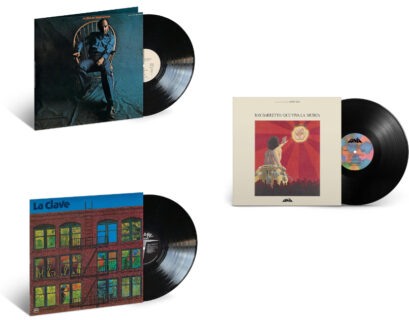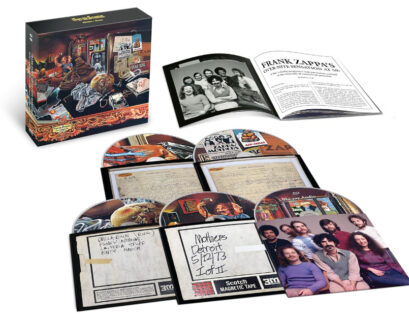It’s the time of year for saving money!
Over the past several years I’ve been making a very deep dive into the music of a master musician from Brazil who is revered among “in-the-know” circles here in America, but widely known the world over: Hermeto Pascoal. Miles Davis is reputed to have dubbed him “the most impressive musician in the world” — [I’ve also read the attribution as being “one of the most important musicians on the planet”] — after his experiences working with Pascoal on the 1971 album Live-Evil which not only featured him on several cuts but also three of his compositions. I have described Hermeto’s music as at times kind of like what might have happened if Frank Zappa and Chick Corea went to Rio on a magical vacation which delivered to the world a love child who grew up with a fascination for making new sounds and instruments (among many, Hermeto legendarily turned a filled tea pot into a water instrument by adding a mouthpiece to it!).
The wiki reports: “Hermeto’s career began in 1964 with appearances on several Brazilian recordings alongside relatively unknown groups. These now-classic albums and the musicians involved (Edu Lobo, Elis Regina, Cesar Camargo Mariano) established widely influential new directions in post-bossa nova Brazilian jazz.”
I have read that in Brazil he is referred to as “The Wizard” (actually, I have been told this recently, unprompted, from new friends I’ve met who are from Brazil!) as he can play pretty much any instrument really well and is self taught! From a bio on the Jazz Is Dead website, promoters of Hermeto’s upcoming U.S. tour (more on that in a moment), they summarize: “Pascoal uses nature as a basis for his compositions and often makes music with unconventional objects such as teapots, children’s toys, and animals, as well as keyboards, button accordions, melodica, saxophones, guitars, flutes, voices, various brass and folkloric instruments. Get ready and expect the unexpected!”
So… I’m sure some of you who are more cynical than even I might be are asking: ‘Well, if he is so great, why isn’t Heremeto Pascoal more well known to the mainstream here in America?’ It is a fair question! And as with anything in life and history, there is usually multiple causation at play. I don’t know all of the details for sure at this point but I can take some educated guesses…
The reality is that fame does not always equate quality — many of my favorite artists are not household names, either due to industry machinations back in the day or due to the artist’s choice. Often times it is a combination of the two and more. In a recent review of Hermeto’s previously unreleased 1976 recordings, the liner notes detailed some important socio-political background behind Pascoal’s career which play into this. (Click here to jump to that review which explores this a bit). I have reviewed other albums by and relating to Hermeto which you find by clicking here.
Hermeto seems to be quite well known and revered most every where around the world except for America, so the reality is that he IS well known in the mainstream. Just not here in the United States’ mainstream! In 2019, Pascoal won the Latin Grammy Award for Best Portuguese Language Roots Album for his album Hermeto Pascoal e Sua Visão Original do Forró.
In my own little way, I have been trying to champion greater awareness of Hermeto’s music from my reviews here on Audiophile Review as well as my posts on social media.
Hermeto’s music is full of surprises. Expect a wealth of Brazilian rhythms happening but betwixt, between, above and below there are melodies galore which take the listener on a journey through wild often whimsical twists and turns through jazz, jazz fusion, the avant garde, folk, classical and even pop musics. At times playing a Hermeto Pascoal album is like listening to a radio station which might be playing the best take on a fluffy Sergio Mendes pop piece which suddenly mutates into a wild freeform flows this side of Edgar Varese, Ornette Coleman or Ascension-era John Coltrane.
Heremeto is coming on tour to America with his band this Summer and if you haven’t scored your tickets for one or more of his shows I would suggest you get them soon (click here for more information on the tour which is sponsored by the folks behind Jazz Is Dead — a different entity, by the way, than the longstanding Grateful Dead jazz tribute groups). And now is a time to get into his music. While in some ways it is very difficult to find his albums on vinyl out in the wilds (more on that in a moment), much of his catalog is available on CD and is streaming on several the important high resolution services including Qobuz, Tidal and Apple Music.
Thus I thought it would be helpful to put together a sort of introductory primer on the artist for those of you who may be interested but not sure where to start. Hopefully some of you may learn something from my excursions…
I mentioned earlier that I have been making a very deep dive into Hermeto’s music and its become an almost obsessive challenge for me. For decades I have had just one of his albums, one of the few issued in America on Warner Brothers Records, 1977’s Slaves Mass. For a long long time I didn’t find any of his albums on vinyl.
The album that in many ways kickstarted my current immersion into Hermeto’s universe is the 2018 release No Mundo Dos Sons which I discovered on an early 2020 trip to New Orleans (where I was visiting many record stores there!). I bought the album blindly knowing that I’d not likely see it again. And I’m glad I got it. You can read my review by clicking here.
Curiously, this amazing album — the title of which translates to roughly “in the worlds of sounds” — isn’t on Qobuz or Tidal any more but is on Apple Lossless (click here) and Spotify (click here). If you can find No Mundo Dos Sons on vinyl, its a smoker with titled tributes to Thad Jones, Ron Carter, Edu Lobo, Jobim, Miles Davis and even Astor Piazzolla. Cuts like “Carlos Malta Tupizando,” “Vinicus Dorin em Buzios” are among my favorites here.
After this and then rekindling my relationship with Slaves Mass already in my collection, I went looking for his music and found some on CD including a wonderful and important Bossa Nova jazz recording from 1967 with Quarteto Novo featuring Airto on percussion and Hermeto on Flute. A lovely listen, this is music which I suspect that Chick Corea listened to and perhaps took some early inspiration from.
Indeed, connecting some musical dots: five years later, Corea later worked with both Airto and his wife, singer Flora Purim on the first two Return To Forever albums (1972’s eponymous debut and 1973’s Light As A Feather). These musical universes intersect again in other places including on Purim’s 1976 superstar session Open Your Eyes You Can Fly (Milestone / Fantasy Records) which includes three compositions each from Chick Corea and Hermeto Pascoal as well as performance contributions from no less than George Duke, Egberto Gismonti, Ron Carter, Alphonso Johnson (and of course Hermeto!).
You can find Quarteto Novo on CD at Amazon (click here) but even that has gone up to mad collector’s prices there for $70-80! It is a little cheaper on Discogs. Original vinyl copies of Quarteto Novo are elusive even online, commanding high prices on Discogs upwards of $200 per album. I have yet to see one anywhere here in America in stores or in the wilds, but I am still looking. Unfortunately, this doesn’t seem to be streaming anywhere these days except for on Spotify (click here). [Ah well, its not the best way to hear this music, but it is a start and better than nothing!].
Another elusive early Hermeto related project is Brazilian Octopus, a lovely more mainstream flavored Bossa Nova flavored pop-jazz group which only released one album in 1969. It too is very rare to find in the wilds on vinyl or even CD (I have yet to see either). Fortunately this album IS streaming in CD quality on Qobuz (click here), Tidal (click here), Apple Lossless (click here) and Spotify (click here).
Hermeto’s fine first album, simply titled Hermeto Pascoal, has recently been reissued by the good folks at Far Out Recordings (London) which I hope to review in the future (I have an original US vinyl issue on Cobblestone Records and a mid-70s reissue on Muse Records). It includes bigger band recordings, orchestral strings and guest performers including the great Joe Farrell, Hubert Laws, Thad Jones, Ron Carter and production from Flora Purim and Airto (who also adds drums and percussion).
Listen to Hermeto Pascoal on: Qobuz (click here), Tidal (click here), Apple Lossless (click here) and Spotify (click here)
Hermeto’s second album released in 1973, A Música Livre De Hermeto Pascoal, is a wonder as it includes perhaps his best known tune, “Bebe” and is a joyous spin. Yet, prepare yourself for that wild ride I mentioned earlier here as he swings and sways from the commercial mainstream to moments of out and out aural mayhem including super emotive screams and shouts!
Listen to A Música Livre De Hermeto Pascoal streaming on: Qobuz (click here), Tidal (click here) and Apple Lossless (click here).
If you like “Bebe,” be sure to check out Hermeto’s 2013 revisitation of it on The Monash Sessions where he does a vocal solo through his home-made water-filled teapot instrument!
Listen to The Monash Sessions on: Qobuz (click here), Tidal (click here) and Apple Lossless (click here)
There is an expanded edition of his 1977 Warner Bros. jazz fusion classic Slaves Mass streaming on most music services. This includes the beautiful and haunting 7/8-time opener “Mixing Pot” and the joyfully manic “A Little Cry For Him” which revolves around some ever escalating scales which turn into the hook of the song as he and the band play a lot with time and speed — a fun frolic!. There are also bonus tracks not on the original LP.
An interesting side note: I just realized this album was co-produced by Kerry McNabb, an audio engineer who worked with Frank Zappa for many years! The album also includes the great Chester Thompson on drums (who was in Zappa’s legendary “Roxy” era band for a good chunk of the 1970s. Ron Carter and Alphonso Johnson are also on this including Airto and Flora Purim. So if you remember my earlier comment about Zappa and Chick, this points to that sort of cross pollination.
Listen to Slaves Mass at: Qobuz (click here), Tidal (click here) and Apple Lossless (click here).
One of my favorites is Hermeto’s 1979 follow on to Slaves Mass called Zabumbe-bum-á which further explores those crossroads between Brazilian rhythms, Jazz fusion and more free form out music flavors, again recalling at times that Corea-Zappa hybrid I mentioned earlier. For what it is worth, a Brazilian musician I befriended recently when he sold me some of his rare original Hermeto albums, cited this album as his favorite. I reviewed the album’s vinyl reissue on Audiophile Review (click here to jump to it). If you like Weather Report, Return To Forever and Zappa’s forays into jazz fusion music you may well enjoy this jam.
Listen to Zabumbe-bum-á at Qobuz (click here), Tidal (click here) Apple Lossless (click here)
I have had some great luck in recent months finding a number of Hermeto’s original vinyl LPs, most of which were not released in America. One of the surprises there is the two LP set titled Hermeto Solo: Por Diferentes Caminhos (Piano Acústico). At times recalling the introspection of Bill Evans and other times the wild abandon of Keith Jarrett, this is a fascinating album that has been growing on me with each listen
Listen to Hermeto Solo: Por Diferentes Caminhos (Piano Acústico) at: Qobuz (click here), Tidal (click here) Apple Lossless (click here)
Gosh, digging into this article I’m discovering many Hermeto albums I’d missed along the way already, such as this beautiful 2017 release Hermeto and Big Band which is pretty much what it sounds like. But don’t expect Benny Goodman or Glenn Miller. If anything this is closer to Gil Evans and Miles Davis’ larger group works in the ‘50s and ‘60s. In fact, the second song on the album is called “Viva o Gil Evans” so you know where Hermeto is coming from on this.
Listen to Hermeto and Big Band at Qobuz (click here), Tidal (click here)
One last album I have just discovered online (and again have never seen in physical form anywhere thus far) is a 2006 release by Hermeto Pascoal and a singer named Aline Morena — who turns out to be his most recent wife! — called Chimarrão Com Rapadura. This is a wild, joyous and beautiful recording that is hard to describe, but it is clearly the work of two musical soul-mates exploring all corners of their relationship. Here, the duo create all manner of musics together, much of it with all instrumental parts overdubbed by Hermeto himself. For example, “Nos” opens up with an accordion and vocal intro that feels like Yma Sumac visiting Mars before transitioning into lovely synthesizer and piano flourishes backing a haunting theatrically jazzy vocal from Morena (think Bertold Brecht/Kurt Weill) and soloing from Hermeto on the Melodica (a handheld keyboard played sort of Harmonica-sounding instrument). For lack of a better reference point, “Baile de Candiero” is sort of like a Mexican “ranchero,” but really it is its own thing.
Listen for yourself to Chimarrão Com Rapadura at: Qobuz (click here), Tidal (click here) and Spotify (click here)
If all this feels a little overwhelming, don’t worry: it is!
But Hermeto Pascoal’s musical riches are deep and rewarding, so it is worth investing the time to journey through his catalog.
If you poke around on some streaming services you’ll probably find some useful compilations such as this one I just discovered called Grandes Mestres da MPB which appears to be a part of a series on the ”grand masters” of Brazilian music such as Gilberto Gil, Baden Powell, Jorge Ben Jon. Antonio Carlos Jobim… and Hermeto Pascoal!
Listen to Hermeto Pascoal’s Grandes Mestres da MPB on: Qobuz (click here), Tidal (click here), Apple Lossless (click here) Spotify (click here).
However you get there, the key thing is to listen to what Hermeto has been creating. With all this fine music at your fingertips, there is no reason to not explore the music of Hermeto Pascoal. I hope you enjoy the journey as much as I am!



























